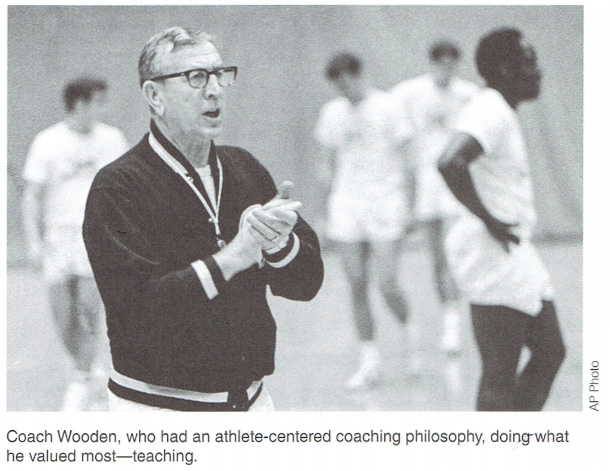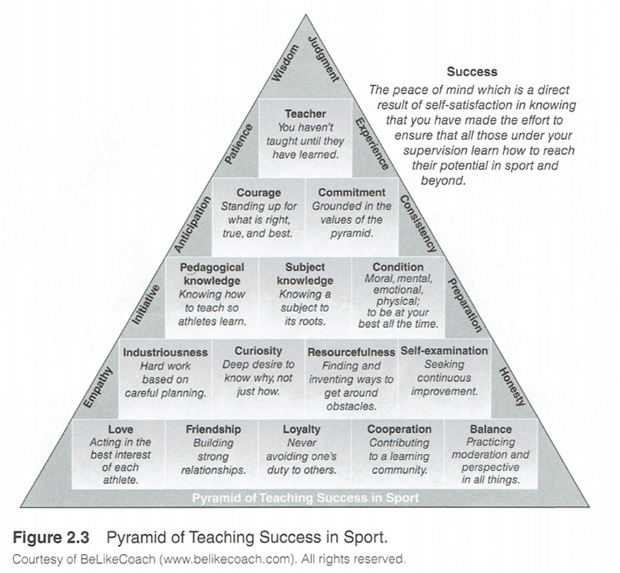|
By: Wade Gilbert Originally Published in: Coaching Better Every Season Provided by: Human Kinetics The Pyramid of Teaching Success in Sport is a popular athlete-centered coaching philosophy framework. Legendary American college basketball coach John Wooden is often identified as a primary source for creating an athlete-centered coaching philosophy. My interactions with and study of Coach Wooden made it clear that athlete learning was the core of his coaching philosophy. Coach Wooden credited his unparalleled success to a relentless quest to improve his ability to teach athletes how to reach their potential in sport and life - what he referred to as competitive greatness.
His athlete-centered coaching philosophy has endured long after his life and career ended, in large part because of his willingness to share his coaching philosophy through the creation of his Pyramid of Success. His Pyramid of Success includes 15 blocks, each representing a desirable outcome for his learners, ranging from industriousness and enthusiasm on the corners to poise, confidence, and competitive greatness at the apex. Although Coach Wooden's original Pyramid of Success provides an overview of athlete characteristics that informed his coaching philosophy, it does not identify the characteristics that coaches should embody if they want to model an athlete-centered coaching philosophy. After a comprehensive review of the literature and reflections on our experiences with Coach Wooden, a group of us created the Pyramid of Teaching Success in Sport (PoTSS). The PoTSS is best viewed as a coach's version of Coach Wooden's original Pyramid of Success for athletes. The PoTSS includes 15 athlete-centered coaching characteristics organized into five tiers (see figure 2.3). The foundational tier reinforces that an athlete-centered coaching philosophy starts with a deep concern for connecting to and building quality relationships with athletes. This first tier includes love, friendship, loyalty, cooperation, and balance. Love and balance were selected as the cornerstones of the PoTSS because they are considered timeless and universal principles of athlete-centered coaching. Love is defined as the selfless altruistic and unconditonal dedication to athlete improvement and success. A coach exhibits balance when his or her actions are aligned with the athlete-centered coaching philosophy. A genuine concern (love) for athletes means that perspective is needed to inform coach decision making, ensuring that a balanced decision can be made.
The second tier includes industriousness, curiosity, recourcefulness, and self-examination. Whereas the first tier focuses externally on connection to the athletes, the second tier focuses internally on self-awareness and self-growth. An athlete-centered coaching philosophy requires coaches to embrace continuous improvement of their ability to help their athletes meet their learning needs. The third tier, considered the heart of the PoTSS, captures the essence of teaching: pedagogical knowledge, subject knowledge, and condition. Being knowledgeable about your particular sport (subject knowledge) is not enough. Adoption of an athlete-centered coaching philosophy requires teaching skill, that is, the ability to translate what you know into meaningful learning experiences for your athletes (referred to as pedagogical knowledge, or knowledge of teaching). Just as athletes require fortitude, coaches require physical, mental, and moral conditioning to model an athlete-centered coaching philosophy. Because of the public and interpersonal nature of coaching, coaches face countless moral and ethical challenges. Courage and commitment, the two characteristics represented in the fourth tier of the PoTSS, are needed to stay on course and ensure that coaching actions are consistent with an athlete-centered coaching philosophy. The apex of the PoTSS is the teacher. Great coaches think of themselves first as teachers—teachers of sport and teachers of life. The ultimate characteristic of a coach who embodies an athlete-centered coaching philosophy is teaching, evident in one of Coach Wooden's favorite maxims, "You haven't taught until they have learned." Adoption of an athlete-centered coaching philosophy results in reimaging how we define success in sport. Contrary to the popular definition of success that depends on defeating others, in the PoTSS success is defined from a self-referenced perspective: "Peace of mind which is a direct result of self-satisfaction in knowing that you have made the effort to ensure that all those under your supervision learn how to reach their potential in sport and beyond." |








